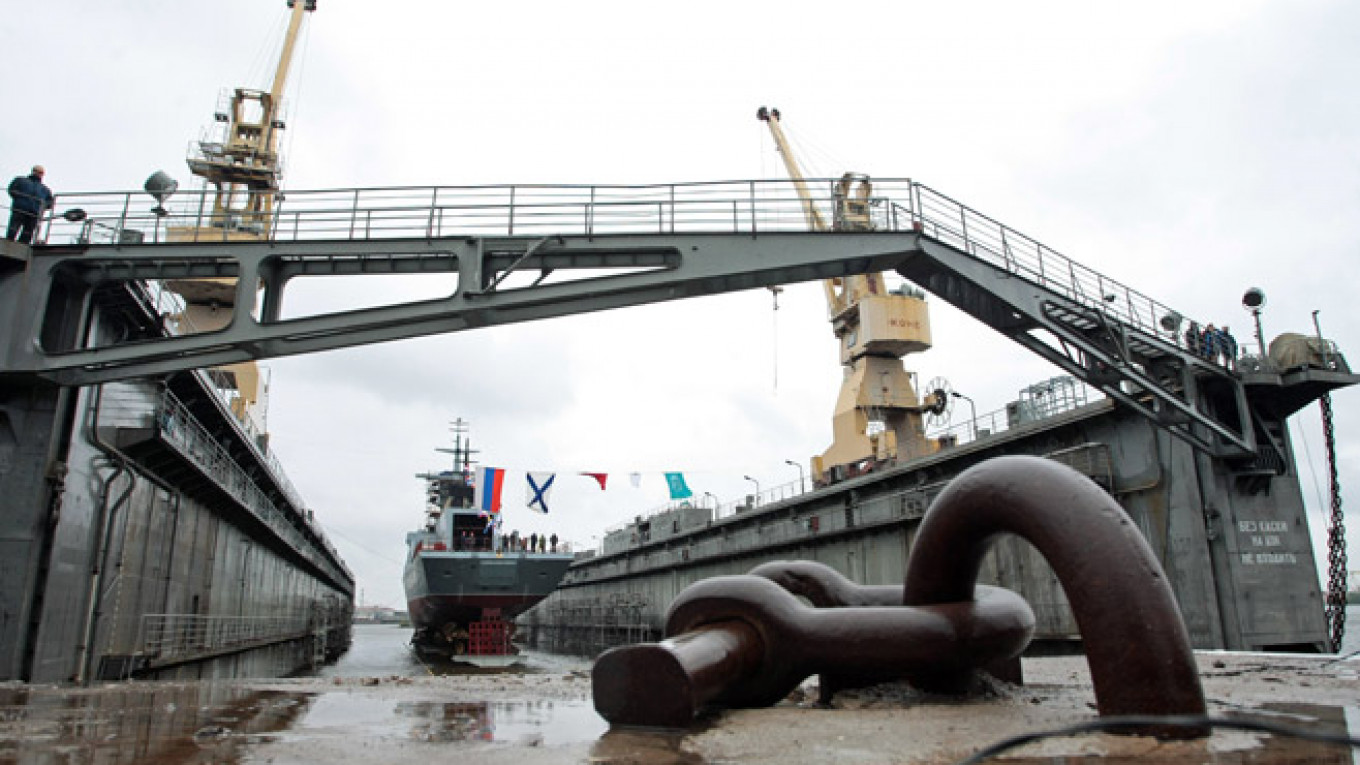A surge in military spending is squeezing the share of civilian projects at Russian shipyards, forcing Russian energy majors to invest in their own shipbuilding facilities to power their ambitious Arctic expansion plans.
With Moscow pumping 20 trillion rubles ($500 billion) into a rearmament drive — a quarter of which is reserved for the navy — Russian military shipbuilding activity swelled this year by 13.8 percent, Deputy Prime Minister Dmitry Rogozin told a government meeting on Monday, news agency RIA Novosti reported. Military projects now account for 81 percent of all Russian shipbuilding, he said.
Civilian shipbuilding has meanwhile expanded by 6.6 percent this year.
"An imbalance still remains," Rogozin said. "I think that this [imbalance] will remain until 2018, when the volume of military ship orders peaks."
The disproportionate rise of military shipbuilding in comparison with civilian projects reflects a nationwide trend: According to a report released by Moscow's Higher School of Economics last month, military orders are propping up Russia's entire manufacturing sector, masking broad stagnation in the country's industrial output.
Russia's plans to expand its civilian shipbuilding capacity has run into several hurdles this year. In April, soon after Russia's annexation of Crimea from Ukraine, Deputy Industry and Trade Minister Alexei Rakhmanov was quoted by Interfax as saying that government funding for the 338 billion ruble ($8 billion) state program to develop domestic shipbuilding capabilities by 2030 would be slashed by 40 percent to accommodate shipbuilding orders for the Russian navy.
Then in July, a tightening of U.S. sanctions on Russia over Ukraine struck United Shipbuilding Corporation (USC), the vast state corporation that owns almost 80 percent of Russia's shipyards, cutting it off from U.S. financing for projects related to Arctic oil and gas extraction. The EU has not imposed sanctions on USC.
Rogozin on Monday acknowledged that state defense orders through 2020 had placed a heavy burden on Russian shipyards. Sevmash, one of the biggest yards, has been cranking out military vessels at a rate that would make Soviet military-industrial planners proud, Rogozin said.
The result is that 80 percent of new civilian vessels in Russia are made in foreign yards, The Merchant, a maritime industry publication, reported last year.
But as Russia ramps up its ambitions to tap the vast natural resources of the Arctic, big energy companies have started to invest in shipyards to build the ice-worthy ships and offshore equipment needed to mine and transport the region's oil and gas.
Last november, with President Vladimir Putin's blessing, state oil giant Rosneft launched a 111 billion ruble ($2.6 billion) project to modernize the Zvezda shipyards in Russia's Far East to manage civilian shipbuilding projects toegether with South Korea's Daewoo Shipbuilding & Marine Engineering Company. Novatek too has expressed interest in the project.
Rogozin on Monday was quoted by Interfax as saying the Zvezda shipyard will begin production of large oil tankers and gas carriers by 2019, but will begin construction of smaller ships by 2016.
Contact the author at bizreporter@imedia.ru
A Message from The Moscow Times:
Dear readers,
We are facing unprecedented challenges. Russia's Prosecutor General's Office has designated The Moscow Times as an "undesirable" organization, criminalizing our work and putting our staff at risk of prosecution. This follows our earlier unjust labeling as a "foreign agent."
These actions are direct attempts to silence independent journalism in Russia. The authorities claim our work "discredits the decisions of the Russian leadership." We see things differently: we strive to provide accurate, unbiased reporting on Russia.
We, the journalists of The Moscow Times, refuse to be silenced. But to continue our work, we need your help.
Your support, no matter how small, makes a world of difference. If you can, please support us monthly starting from just $2. It's quick to set up, and every contribution makes a significant impact.
By supporting The Moscow Times, you're defending open, independent journalism in the face of repression. Thank you for standing with us.
Remind me later.






